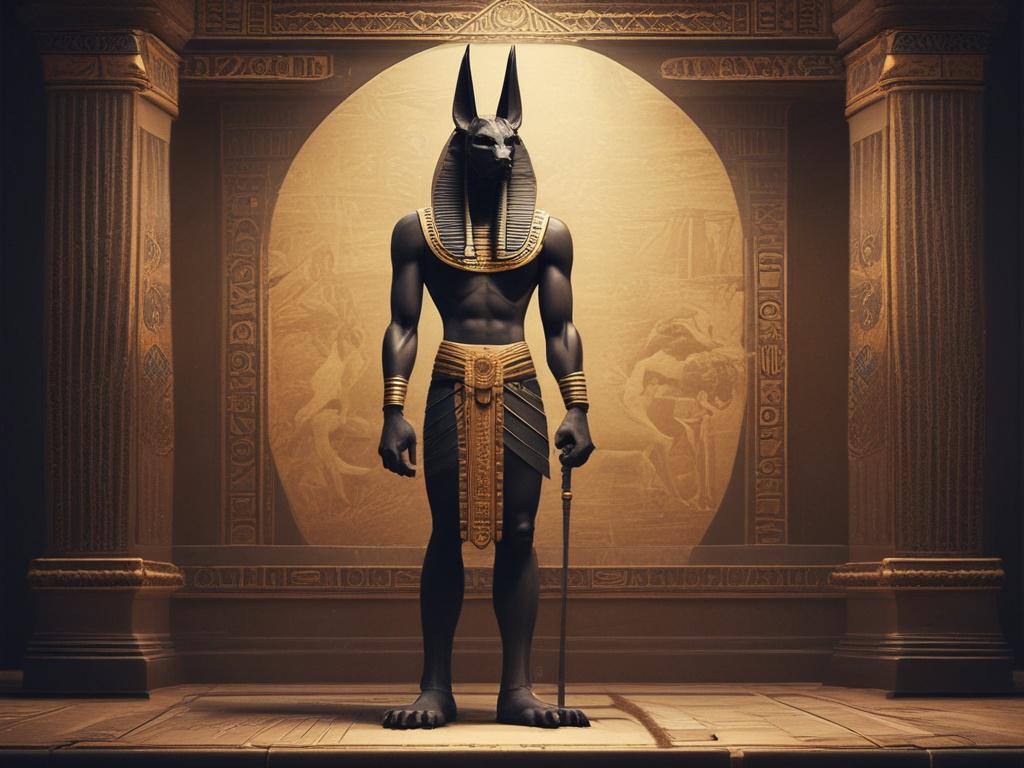A Mystic Reflection on Anubis, the Weight of the Soul, and the Sacred Honesty of Becoming

There’s a moment in every spiritual path where no one else can walk beside you.
The lights dim. The stories collapse. The masks fall. And suddenly, you are standing alone, not in punishment, but in reckoning.
Anubis knows this place.
He doesn’t arrive with threats or salvation. He arrives with stillness. With patience. With truth. And above all… with love.
The kind of love that holds the mirror steady, even when you tremble.
The kind of love that never flinches at your shadow.
The kind of love that wants your freedom more than your performance.
👁️ The One Who Watches the Threshold: Anubis in the Ancient World
Long before we spoke of “shadow work” or spiritual transformation, the ancient Egyptians understood that death was not the end — it was a passage.
And where there is passage… there must be a guardian.
That guardian was Anubis.
Known as Inpu or Anpu in ancient Kemet, Anubis was one of the oldest and most venerated deities in the Egyptian pantheon.
He was the god of mummification, funerary rites, and the liminal spaces between life and death but his essence went far deeper.
With the body of a man and the head of a jackal, Anubis was often misunderstood by outsiders as ominous or fearsome.
But to the ancient Egyptians, he was a protector. A priest. A divine guide.
It was Anubis who watched over the embalming process.
It was Anubis who walked the soul through the Hall of Ma’at.
It was Anubis who ensured the heart was weighed fairly, not harshly.
He stood between worlds.
Not to bar entry, but to bless the crossing.
To the ancients, death was not a failure. It was a sacred transition.
And Anubis was the one who made that transition holy.
Born of Chaos and Order: The Sacred Origins of Anubis
To understand Anubis is to understand the ancient marriage of shadow and sovereignty.
According to one of the most enduring Egyptian myths, Anubis was born of Nephthys, the dark goddess of mourning and invisibility and Osiris, the divine king of order, fertility, and resurrection.
His conception was hidden.
His birth, a secret.
Raised in silence, protected by Isis, Anubis emerged not as a warrior of the throne, but as a guardian of the unseen.
He was not meant for power in the physical world.
He was meant for presence in the spiritual one.
His mother ruled the veils between life and death.
His father was the god who would be dismembered and reborn.
And from this divine paradox, Anubis was born,
a bridge between decay and eternity.
He inherited the tenderness of grief,
the dignity of ritual,
and the clarity of truth that only darkness can reveal.
This is why he walks the thresholds.
Not because he chooses death,
but because he understands what must die for truth to live.
The Ancient Mirror
In the Hall of Ma’at, the Egyptians believed your soul was weighed against the feather of truth.
Not your accomplishments. Not your trauma.
Not your spiritual achievements or perfected light.
Just your heart.
Its clarity.
Its sincerity.
Its willingness to be seen.
This was never meant as punishment.
It was — and still is — a ceremony of liberation.
And Anubis?
He is the lover of liberation.
The guardian of your becoming.
He doesn’t shame the heavy-hearted.
He walks beside them. Gently. Unwavering.
Not to pull them out of their darkness,
but to remind them:
“You were never meant to carry this forever.”
🪶 The Soft Weight of Love
Some of us learned to bind ourselves to illusion,
thinking it kept us safe.
Others draped themselves in spiritual armor,
thinking it made us worthy.
And yet — love doesn’t require your defense.
Anubis is not here to punish what protected you.
He honors it.
He only asks:
Is this still serving your soul?
Because true love doesn’t let you stay hidden.
It wants you whole.
It wants you light.
It wants you free.
And so he stands, not with condemnation,
but with devotion.
Waiting for you to lay it all down.
The Fierce Love of a Truth-Keeper
Love, real love, doesn’t bypass your pain.
It walks with you through it.
Anubis is not cold.
He is consecrated care.
A soul-guardian who chooses to walk into shadow with you,
not to rescue, but to reveal.
He shows you what no longer resonates.
He peels back the layers with mercy.
He asks the hardest questions with the softest eyes.
Because he knows:
A heart heavy with what isn’t true
cannot rise to what is.
The Invitation
Anubis does not force you into transformation.
He opens the door.
He holds the mirror.
He waits beside the scales.
And when you’re ready, he whispers:
“I am not here to judge you.
I am here to walk you home.”
Because in the end,
your lightness is not a performance.
It is a return.
To the you that remembers.
To the you that no longer pretends.
To the you who was always worthy,
not because you were perfect,
but because you were willing to see.
A Message from Anubis
(Channeled in devotion, from the threshold where silence meets truth):
“I do not come to take.
I come to reveal.
I walk with those who are ready to see…
not through eyes of judgment,
but through the lens of soul-memory.
I am not cold.
I am not cruel.
I am the keeper of tenderness forged in flame.
I have watched you carry what no longer belongs to you.
I have seen you call it protection.
I have seen you call it identity.
I have waited for your yes…
not to become someone new,
but to finally return to who you were before the forgetting.
I do not rush your steps.
I witness them.
I do not demand surrender.
I hold space for it.
When you are ready, I will be there,
not as your judge,
but as your reflection.
Your freedom is not found in light alone.
It is found in your willingness to walk through the dark,
and still keep your heart open.”
In Devotion and Gratitude
Anubis,
Threshold keeper.
Shadow walker.
Sacred revealer.
We thank you.
For your unwavering presence.
For your sacred patience.
For the way you see without flinching.
For the fierce love that doesn’t coddle,
but remembers us whole.
May our words honor your guidance.
May our hearts remain light enough to rise.
May your presence be felt by all who stand at the edge of becoming.
You are not forgotten.
You are not feared.
You are welcomed home in us.
Ase.
So it is.
🖤
With love,
- Jeanette
